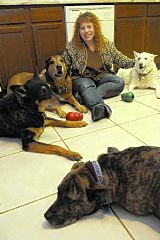Trainer preaches manners for multi-dog families
Saturday, January 22, 2011
By Susan Banks, Pittsburgh Post-Gazette
Rebecca Droke/Post-Gazette.
Having more than one dog can mean double the love, but it can also mean double the problems.
When North Side resident Debby McMullen became a multiple-canine owner, she couldn’t find any information on how to deal with the daily issues of a multiple-dog household, including controlling mealtimes, sleeping arrangements and group training. So Ms. McMullen, now a professionally certified dog trainer, wrote a book.
“How Many Dogs?! Using Positive Reinforcement to Manage a Multiple Dog Household” (Tanacacia Press, $19.95) attempts to answer most questions a multiple-dog owner might come up with. The methods are tried and true and used on Ms. McMullen’s “crew,” which now number four, with an occasional rescue thrown in as well as many of her clients’ animals.
She’s been a professional trainer since 2002, when she started her dog training and consulting business, Pawsitive Reactions. Her current profession came about by accident. She volunteered at a local shelter where one of the trainers noticed that she had a particular talent with the more unruly pets. She found dealing with difficult canines to be exciting and challenging. Yes, she was bitten, but that happened early in her training career. The goal these days, she says with a laugh, is to not give the dog the opportunity or reason to bite.
She describes positive reinforcement training as a way to set guidelines. There are consequences, but they don’t include punishment. Instead, the animal may be denied a treat or attention.
Every multiple-dog household has a different dynamic, she notes, but the training remains the same.
“It boils down to requiring manners and being the leader, not allowing a pushy dog to get away with stuff. It’s also about teaching people how to set guidelines and what to do when a problem arises,” she says.
The two most common issues Ms. McMullen is called about are aggression and fighting. Again, she stresses the establishment of manners.
“Dogs that have manners, and understand that’s what gets them good stuff, tend to not push the other dogs around,” she says.
She also advises not to play favorites: “Everybody gets stuff and nobody is more important than anybody else. When [the dogs] understand that, life is a lot easier.”
While her book can answer many questions, there are times when a professional should be consulted. If the owner is worried about a human or another dog in the family, they should call in a professional. If they are afraid to walk the dog, they need help — even if they go to a class.
“It’s almost always the behavior of the human that can change what is going on. So often it’s such a minor adjustment,” she says.
And often the problem can be addressed quickly by a professional.
What does she want readers to take away from her book?
“I want them to be able to quickly thumb to a chapter when they have an issue. If their biggest issue is feeding time, they can go to that chapter. If they have an issue with walking, they can go to that chapter. … I would have liked one of these when I was accumulating dogs.”
Ms. McMullen specializes in multiple-dog issues and provides in-home training that includes basic manners, behavior modification, advanced training and therapy-dog training. She also offers puppy selection guidance and has given advice and consulted on adding another pet to a multiple-pet household. On occasion she gives classes. Her website is www.pawsitivereactions.com.
Susan Banks: sbanks@post-gazette.com 412-263-1516.
First published on January 22, 2011 at 12:00 am
Read more: http://www.post-gazette.com/pg/11022/1119738-51.stm#ixzz1Du0nO300

